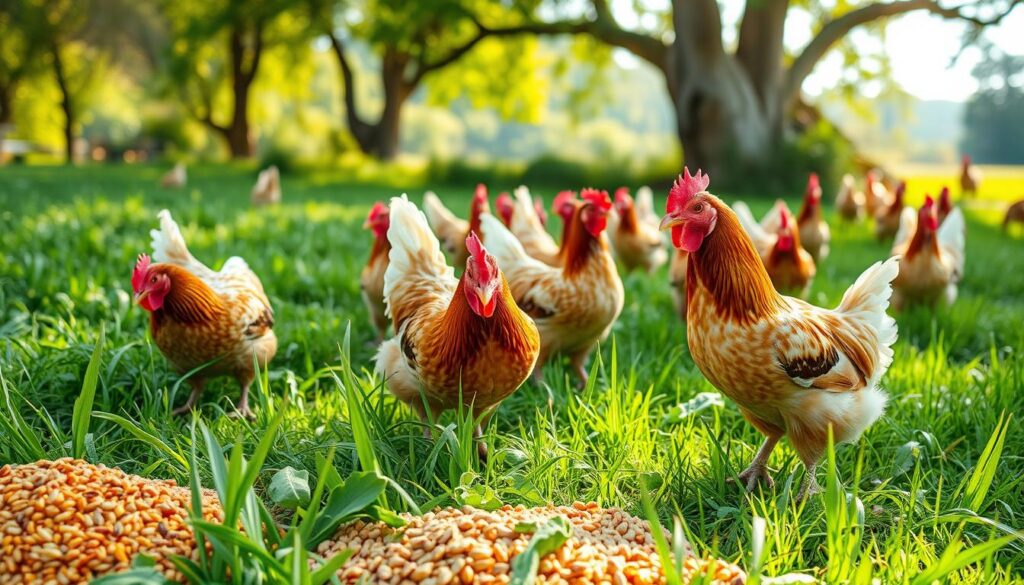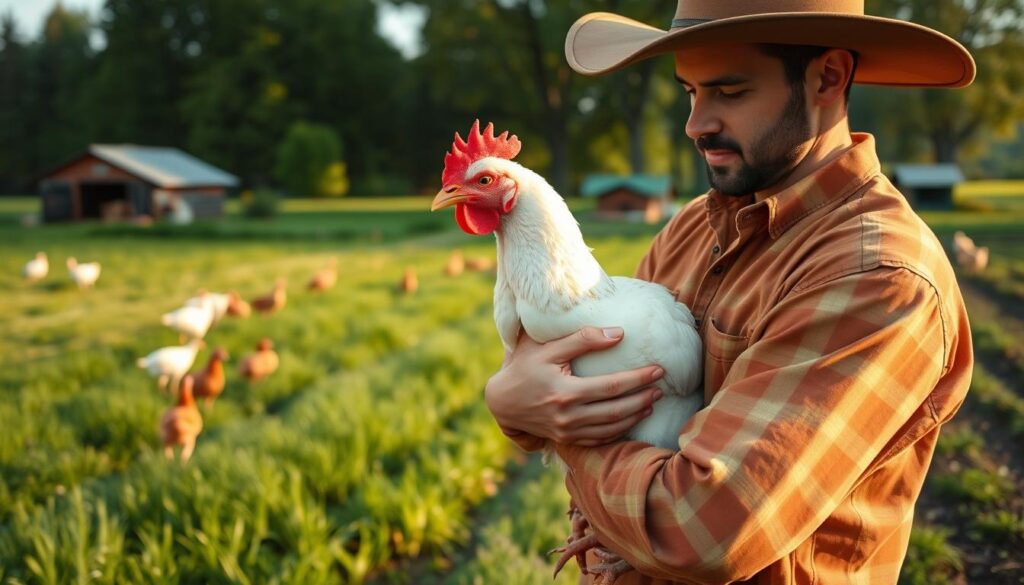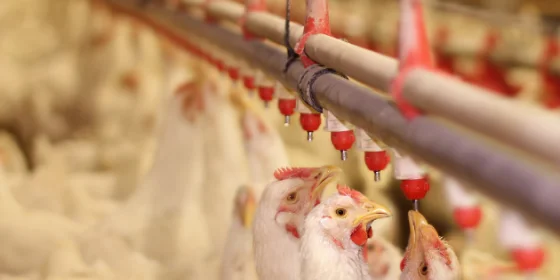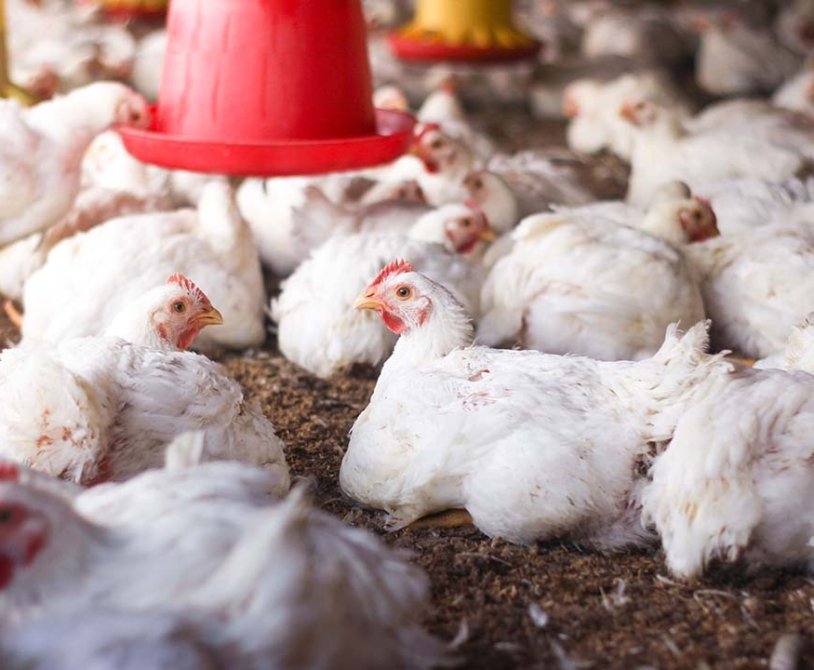As a poultry farmer, taking care of your broiler chickens is key. This article will show you how to check and boost their welfare. You’ll learn how to make your farm better, meet standards, and follow sustainable poultry farming practices.
Improving their living space, health, and handling is crucial. This guide will give you the tools to do just that. By focusing on animal welfare, you’ll meet ethical standards and help produce better, cheaper, and greener poultry.
Key Takeaways
- Understand the importance of ethical poultry farming and broiler chicken welfare
- Learn strategies to monitor and improve living conditions, nutrition, and flock health
- Implement humane handling and transportation procedures for broiler chickens
- Explore sustainable poultry farming practices and industry certifications
- Enhance farm productivity and meet consumer demand for ethical, environmentally friendly poultry
Introduction to Broiler Chicken Welfare
Ethical poultry farming puts the welfare of broiler chickens first. These birds, raised for meat, should live comfortably and healthily. It’s our duty to know the importance of ethical poultry farming and tackle broiler chicken welfare concerns.
Importance of Ethical Poultry Farming
Ethical farming is key for both the birds and the industry. It leads to healthier flocks, less disease, and meets consumer demand for responsible meat. Following poultry industry best practices also boosts the industry’s reputation and future.
Overview of Broiler Chicken Welfare Concerns
Broiler chickens face many welfare issues, including:
- Overcrowding and limited space, leading to behavioral restrictions and increased risk of injuries
- Inadequate environmental conditions, such as poor air quality, improper lighting, and suboptimal temperatures
- Nutritional deficiencies and imbalances, which can impair growth and overall health
- Increased susceptibility to health problems, including lameness, respiratory issues, and infectious diseases
- Inhumane handling and transportation practices, causing stress and potential injuries
Understanding these broiler chicken welfare concerns helps farmers improve their flocks’ well-being. This supports the importance of ethical poultry farming.
| Welfare Concern | Potential Impact | Recommended Best Practices |
|---|---|---|
| Overcrowding | Increased risk of injuries, behavioral restrictions, and disease transmission | Maintain appropriate stocking density, provide adequate space for natural behaviors |
| Environmental Conditions | Respiratory issues, heat stress, and reduced productivity | Ensure proper ventilation, temperature, lighting, and litter management |
| Nutrition | Growth abnormalities, weakened immune system, and reduced performance | Formulate balanced diets, monitor feed quality, and provide clean, fresh water |
| Health Problems | Decreased welfare, higher mortality rates, and economic losses | Implement proactive disease prevention measures, provide veterinary care, and monitor flock health |
| Handling and Transportation | Stress, injuries, and higher mortality rates | Train personnel in humane handling techniques, minimize transport duration, and provide proper crating |
By tackling these broiler chicken welfare concerns and following poultry industry best practices, farmers can improve the importance of ethical poultry farming. This benefits the well-being of their flocks.
How to Monitor and Improve Broiler Chicken Welfare on Your Farm
Looking after your broiler chickens is a big responsibility. It’s not just about doing the right thing; it also helps your farm run better. By keeping a close eye on your chickens and making smart changes, you can make their lives better.
Checking on your chickens regularly is key. You need to watch their health, how they act, and their living space. Here are some important steps:
- Check your chicken houses often. Look at the litter, temperature, humidity, and air quality.
- Watch for any signs of sickness or injury in your chickens. This includes lameness, feather loss, or odd postures.
- Keep an eye on how your chickens behave. Note how they eat, drink, rest, and move around.
- Track important numbers like how much they weigh, how much food they eat, and how many die.
With all this data, you can spot where you need to do better. Then, you can make changes based on what you’ve learned. This might mean better homes, air, and food for your chickens. You might also add fun activities and work on keeping diseases away.
| Welfare Indicator | Monitoring Approach | Potential Improvement Strategies |
|---|---|---|
| Litter Quality | Regular visual inspections and moisture testing | Implement proper litter management, including frequent replacement and ventilation adjustments |
| Lameness | Observe bird gait and posture during routine checks | Optimize nutrition, provide appropriate flooring, and address any underlying health issues |
| Feather Condition | Visually assess feather cover and quality | Adjust feed formulation, provide enrichment activities, and reduce environmental stressors |
By always checking and improving how your chickens live, you’re doing the right thing. You’re also making your farm more sustainable and profitable.
Maintaining Optimal Living Conditions
Keeping broiler chickens healthy and happy is key. Understanding what they need in their environment is important. This includes the right housing and air quality.
Environmental Factors for Broiler Chicken Health
Many environmental factors affect broiler chicken health. Temperature, humidity, and air quality are crucial. They should live in temperatures between 68°F and 77°F, with humidity between 50% and 70%.
Good ventilation is also vital. It helps control these factors and keeps the air clean. This prevents harmful gases and ensures enough oxygen.
Proper Housing and Ventilation Requirements
The housing for broiler chickens must be clean and well-ventilated. It should give them enough space, at least 0.75 square feet per bird. Ventilation systems, like fans and air inlets, are needed for fresh air.
It’s important to check and adjust these systems often. This ensures the best living conditions for your chickens.
“Providing broiler chickens with a comfortable and healthy living environment is not only the ethical thing to do, but it also contributes to the overall productivity and profitability of your poultry operation.”
By focusing on the needs of broiler chickens, you can run a successful and caring operation. This benefits both the chickens and your business.
Broiler Chicken Nutrition and Feeding
Keeping broiler chickens well-nourished is key to their health on your farm. A balanced diet helps them grow, develop, and stay healthy. Knowing how to feed them right is important for their well-being.
A good diet for broiler chickens includes protein, carbohydrates, fats, vitamins, and minerals. Protein, like soybean meal, helps their muscles grow. Carbohydrates, such as corn, give them energy. Fats help with energy and keeping warm.
It’s also important to feed them properly. Giving them consistent, ad-libitum access to feed lets them eat when they need to. Checking the quality and taste of their food helps them eat better.
| Nutrient | Function | Recommended Levels for Broilers |
|---|---|---|
| Protein | Muscle development and growth | 20-23% of diet |
| Carbohydrates | Energy source | 55-60% of diet |
| Fats | Energy, insulation, and nutrient absorption | 4-8% of diet |
| Vitamins and Minerals | Support overall health and immune function | Varies by specific nutrient |
By giving them a balanced broiler chicken diet and the right feeding, you help them stay healthy. This supports their growth and well-being on your farm.

Monitoring Broiler Flock Health
Keeping your broiler flock healthy is key for good production and fair farming. Watch your birds closely to spot any signs of trouble. This way, you can fix any welfare issues quickly.
Physical Indicators of Broiler Chicken Welfare
Checking your broiler chickens’ physical health is important. It tells you how they’re doing overall. Look for these signs:
- Body condition: Make sure they’re not too thin or too fat.
- Skin integrity: Watch for any skin problems like lesions or irritation.
- Respiratory function: Check if they’re breathing okay.
Behavioral Signs of Stress and Discomfort
Watching how your chickens act can also tell you a lot. Look out for these signs of stress:
- Excessive feather pecking or aggression towards flock mates
- Decreased activity or lethargy
- Altered feeding or drinking habits
- Increased vocalizations or distress calls
By paying attention to these signs, you can help your chickens stay healthy and happy.
| Physical Indicator | Interpretation |
|---|---|
| Body Condition | Evaluate for optimal weight, muscle tone, and fat coverage |
| Skin Integrity | Check for lesions, bruises, or irritation |
| Respiratory Function | Monitor for signs of distress or difficulty breathing |
Humane Handling and Transportation
It’s vital to keep broiler chickens safe and happy from farm to processing. Humane broiler chicken handling and broiler chicken transportation best practices help reduce stress and discomfort. This is key for ethical poultry farming.
For humane broiler chicken handling, farmers should use gentle and calm methods. This means:
- Avoiding rough handling or sudden movements that can frighten the birds
- Providing adequate lighting and avoiding excessive noise during handling
- Using appropriate equipment, such as crates and ramps, to facilitate smooth loading and unloading
For broiler chicken transportation best practices, keeping birds comfortable and safe is crucial. This includes:
- Providing adequate ventilation and climate control in the transport vehicle
- Minimizing transportation time and avoiding unnecessary delays
- Ensuring the vehicles are properly designed and maintained to prevent injuries or suffering
Following ethical broiler chicken processing methods shows a farm’s commitment to humane broiler chicken handling and broiler chicken transportation best practices. This benefits the animals and builds trust with consumers. It also meets the growing demand for responsible and sustainable poultry farming.
“Ethical treatment of broiler chickens is not only the right thing to do, but it also reflects positively on the farm’s reputation and can improve consumer perception of the industry as a whole.”

Broiler Chicken Welfare Certifications
Broiler chicken welfare certifications are key in ethical poultry farming. They show that producers follow high standards for chicken care. Farmers get these certifications to prove they care for their chickens well.
The audit process checks many things. It looks at where chickens live, what they eat, and how they are kept healthy. Auditors from outside the farm check if everything meets the welfare guidelines. Then, they give out certifications.
Key Broiler Chicken Welfare Certification Programs
- PAACO (Professional Animal Auditor Certification Organization) certification: Shows farms care about animal welfare and follow strict animal care rules.
- Certified Responsible Antibiotic Use (CRAU) certification: Makes sure antibiotics are used wisely, helping keep chickens healthy and preventing antibiotic resistance.
- Global Animal Partnership (GAP) certification: A program that checks and certifies farms based on their animal welfare practices.
| Certification Program | Key Requirements | Benefits |
|---|---|---|
| PAACO Certification |
|
|
| CRAU Certification |
|
|
| GAP Certification |
|
|
Getting broiler chicken welfare certifications shows farmers care about ethical farming. It also opens doors to better markets, improves their reputation, and meets consumer needs for responsibly raised chicken.
Sustainable Poultry Farming Practices
More people want chicken that’s raised right, so farmers are changing their ways. They focus on keeping broiler chickens happy and protecting the planet. This new approach makes farming better for animals and the environment.
Ethical Broiler Chicken Production Methods
Farmers now care more about how they treat chickens. They give chickens lots of room, light, and fun things to do. This makes the chickens healthier and the meat better.
Environmental Impact of Broiler Farming
Good farming also means being kind to the Earth. Farmers are finding ways to use less and waste less. They’re using new ways to manage waste and energy, making farming greener.
FAQ
What are the key factors to consider when monitoring broiler chicken welfare on my farm?
To monitor broiler chicken welfare, focus on a few key areas. Ensure their living conditions are optimal, like temperature and air quality. Also, provide a balanced diet and observe their health and behavior closely. Lastly, handle and transport them humanely.
How can I improve the living conditions for my broiler chickens?
To better the living conditions for your broiler chickens, start with the basics. Keep their environment at the right temperature and humidity. Make sure they have enough space and clean, dry bedding.
Also, give them access to clean water and a nutritious diet. Watch for stressors and maintain a clean environment through regular cleaning and disinfection.
What are some physical and behavioral indicators I should monitor to assess broiler chicken welfare?
When checking on broiler chicken welfare, look at their physical health. Check their body condition, skin, and feathers. Also, observe their breathing.
Watch their activity levels and how they eat and drink. Look for any signs of stress or discomfort in their behavior.
How can I ensure humane handling and transportation of my broiler chickens?
To handle and transport broiler chickens humanely, train your staff well. Teach them to handle the chickens gently and quietly. Use the right equipment and crates for safe transport.
Make sure they’re not too crowded and have enough air. Keep an eye out for any signs of distress. Follow best practices for their care.
What are the benefits of obtaining broiler chicken welfare certifications for my farm?
Getting certifications for broiler chicken welfare has many benefits. It shows you care about animal welfare and meets industry standards. It can also make your products stand out in the market.
The certification process includes audits by third parties. This helps you find areas to improve and ensures you meet welfare standards.



